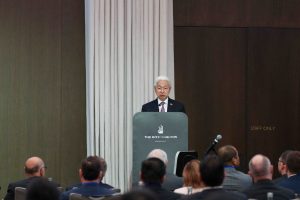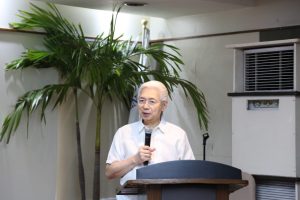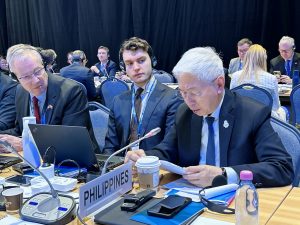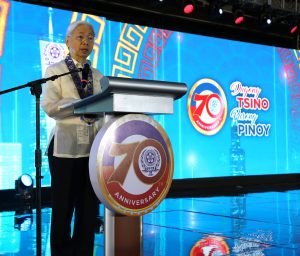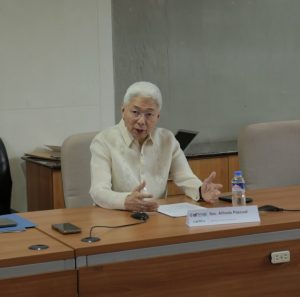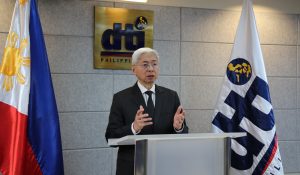Ladies and gentlemen, a good day to all Filipinos, the citizens of Hong Kong, and foreign businessmen who have joined us today. Thank you to the Hong Kong government—especially our good friend Secretary Edward Yau and his team—for organizing this webinar with us.
As the Philippines builds back better from the pandemic, we hope to strengthen trade and investment ties with other countries and regions, especially under our “Make It Happen in the Philippines” investment promotion brand. Hong Kong is one of those regions that the Philippines has a very close relationship with, given President Rodrigo Roa Duterte’s independent foreign policy that led to stronger ties between the Philippines and China in the past few years.
Hong Kong is the nearest major international and global trading center for Manila, just about one and a half hour by plane and our sea trade routes are one of the busiest for Manila.
Hong Kong is our 4th largest trading partner, our 4th biggest export market, our 11th import supplier, and our 16th investment source in 2020.
Our trading and investment partner-companies in Hongkong can surely ride on the Philippines’ expected recovery this year. We believe that the continued gradual and calibrated reopening of the economy—together with the country’s roll-out of vaccination—is keeping us on track towards a V-shaped recovery. We are already seeing some signs of recovery with respect to our GDP growth, record investment and export growth rates, net foreign direct investments, and manufacturing capacity performance, lowering unemployment rates, among others.
Our only concern in our recovery efforts are the new variants like the Delta Variant, and now even the Delta Plus Variant, similar to what hit other countries, and so we are adopting a calibrated and safe reopening, one that leans toward more economic activities, without risking potential recurrence of surge of COVID cases. It is a delicate balance that we have to keep.
But we have also observed that any effort to reopen our economy, no matter how small, quickly translates into economic gains, thanks to our country’s robust economic fundamentals. After all, before the pandemic, we were growing at an average of 6.6% from 2016 to 2019 and became the 3rd fastest growing economy in Asia.
This is because our economy’s resilience can be attributed to one of our key advantages—our people. We still can count on our 110M population that has a demographic sweet spot and an average young age of 25 years old. And that means more productive years ahead of them, providing also a rich pool of 49M manpower resource needed for growth, as well as a continuously growing consumer base with increasing income and purchasing power. Additionally, our country produces over 700,000 graduates yearly, and thanks to a learning culture that is multi-lingual, multi-cultural, and with a high resource power.
This 49M manpower are highly-skilled, highly-technical, educated, dedicated, and cost-efficient workforce with very low attrition rate. Our people are well known across the world as highly capable, hardworking, highly trainable, fluent in English, and with cost-competitive talent. They also have a persevering attitude even as part of corporate culture. They can think global and act local.
Meanwhile, the Philippines has preferential access in major markets through our Free Trade Agreements (FTAs), including the EU’s Generalised Scheme of Preferences Plus (GSP+). Moreover, our US Generalized System of Preferences (GSP) is under discussion for renewal, but we hope to strengthen our relationship beyond the GSP and graduate towards an FTA. Furthermore, the Philippines is part of the Regional Comprehensive Economic Partnership (or RCEP) Agreement, which is intended to create in the region a more business-friendly – rules based, predictable business environment. And just to add, we’ve officially submitted our interest to join the Comprehensive and Progressive Agreement for Trans-Pacific Partnership (or CPTPP), which would expand the Philippines’ trade ties, that will create more opportunities to enhance competitiveness and market access for companies in the country.
As we are fighting the pandemic, the Philippines stayed the course in terms of implementing major economic reforms, to make the Philippines more conducive for companies to conduct and continue business operations. One is the Corporate Recovery and Tax incentives for Enterprises (or CREATE) Act, which is a game-changing legislation that will make the investment climate in the Philippines significantly more attractive.
Another is the continued rollout of the government’s massive “Build, Build, Build” infrastructure program, which has prioritized key projects amounting to Php8-9T or around US$ 188 Billion for 2016-2022, over the 6 year leadership of President Duterte. This has brought investments in infrastructures to record levels, accounting for around 7% of GDP, which grew from a typical level of 2% in the past administrations. These are ready for implementation and responsive to the country’s post-pandemic needs for major economic infrastructures.
Moreover, before the pandemic, we started to implement more Streamlining and Digitalization in government services as part of the Ease of doing business program.
These are just a few of the many reasons why the Philippines is an ideal complement to Hong Kong businesses that plan to expand their research and development activities, manufacturing activities, and IT and business process management activities. Just to note, we have a lot of companies with Hong Kong equity doing business in the Philippines, like toy manufacturer Bandai Namco, electronic components manufacturer Beltontotoku Philippines, electronic data processing products provider Hewlett-Packard HK SAR Ltd. – Philippine Regional Operating Headquarters, elevator company Asia Schneider Limited, and electronic products manufacturer on Semiconductor Cebu Philippines, to name a few.
We’d also like to point out that the Philippines can be a strategic hub in the Asia-Pacific for hyperscalers. We would like to invite you to look at the Philippines to either co-locate or put up your data centers here, leveraging on our large population and propensity to consume data, foreign content, and cloud services. We also have the necessary infrastructure as well as the regulatory environment to attract hyperscalers.
Meanwhile, with the Guangdong-Hong Kong-Macao Greater Bay Area as a key driver of Mainland China’s development, Hong Kong is a great platform for Filipino companies and Filipinos in the service sector to connect with companies in the area and around the world. Further, due to Hong Kong’s extensive experience working with foreign investors, you are a perfect launch pad for Belt and Road initiatives in the Philippines.
Before we end, we’d like to assure you that the Department of Trade and Industry (DTI)—through the Board of Investments (BOI) and the Philippine Trade and Investment Center (PTIC) in Hong Kong—are here to assist you and facilitate your business interests. The Philippines is ready to be a valuable contributor to your global business’ growth, and as a partner in global rebuilding after the pandemic.
Thank you very much, mabuhay po tayong lahat, and welcome to today’s webinar. ♦
Date of Release: 29 June 2021




